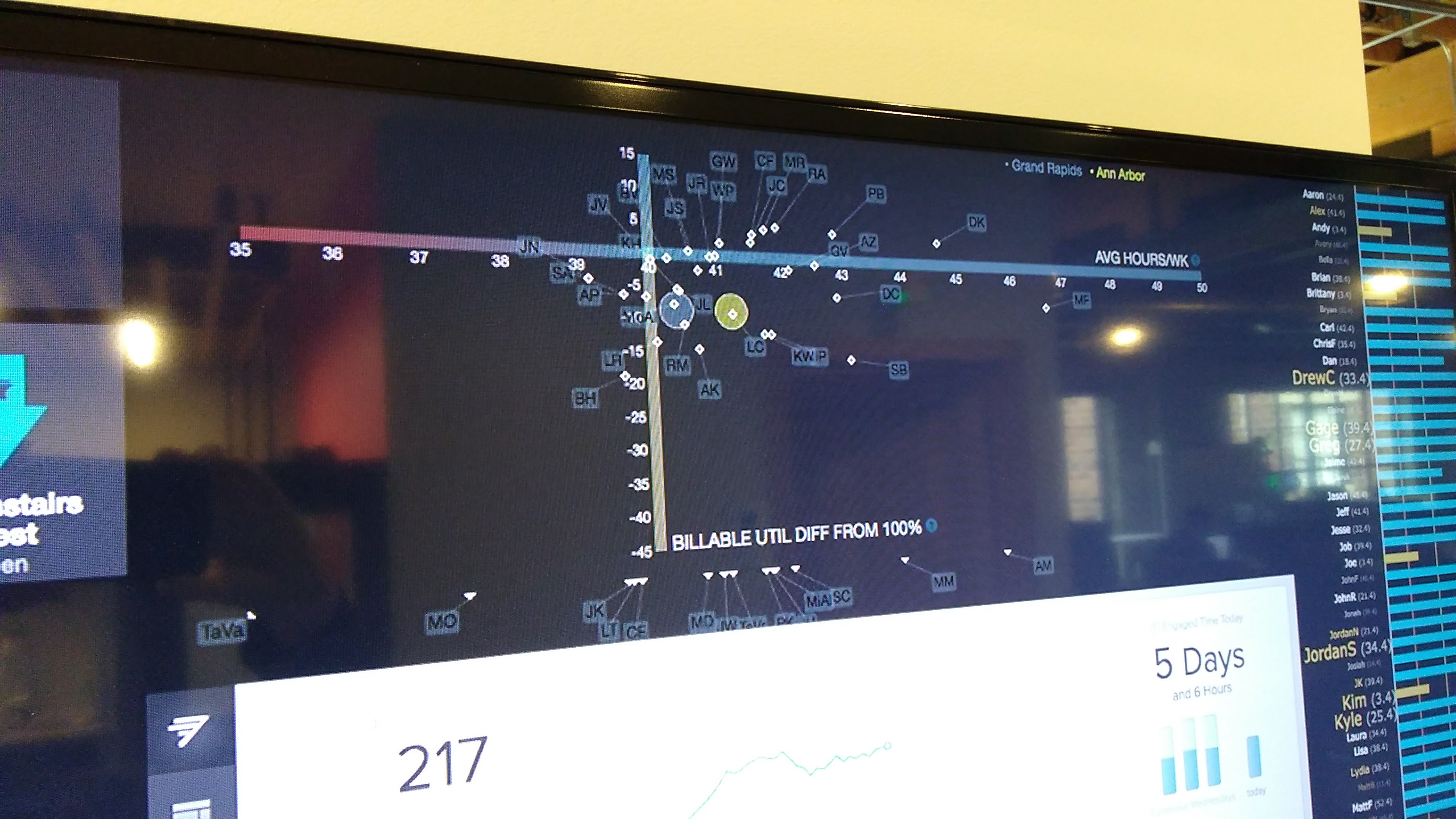Have you ever had a co-worker or employee share a feeling of unfairness about their efforts going unnoticed or unrewarded based on their fixed salary? Do you ever have clients question the fairness of invoices because they perceive the final deliverables to be less valuable than the cost? Do you ever consider why it seems hard to accomplish company initiatives?
Fairness between the company, employees, and clients is key to the healthy business performance of a consultancy. Fairness leads to long-term, high-quality employee and client relationships. To maintain fairness in employee and client relationships, you have to create an ongoing, measurable, fair exchange of value.
One of the reasons we track our time in detail at Atomic Object is because we believe time contributed is the most fair way to compensate employees and invoice clients. Value contributed for time spent can vary in the short-term, but a fair, time-based rate smooths variation in the long-term and creates a consistent standard for measurable exchange of value.
This is the second in a series on the benefits of detailed time tracking:
- Atomic’s Approach to Time Tracking
- Time Tracking for Focus
- Time Tracking for Fairness
- Time Tracking for Sustainability
- Time Tracking for Growth
Individual Fairness
Atomic pays employees based on an hourly rate and hours worked per pay period.
The hours I work during a pay period determines my compensation. Working a full-time job requires a minimum contribution of hours, and working additional hours increases my compensation. Atomic will appropriately adjust my compensation if I work a few less hours in a pay period than usual.
Atomic’s hours and utilization information radiator allows me to see:
- I’m meeting my hours commitment for working a full-time job
- I’m working a fair amount of hours relative to others
- Other individuals are not taking on an unfair workload
- Everybody is working their fair share based on their hours expectations
Team Fairness
Project teams track and invoice for time worked on a client’s project. Our project status reports and invoices allow clients to clearly see the time spent and results delivered.
We believe transparency on time spent reinforces fairness and trust. Clients don’t wonder if we are completing work faster than estimated and over-billing them.
Time-based invoicing is also fair when our work identifies complexity or considerations that require an increased contribution of time.
Our time-based, hourly model cultivates a unified relationship where our teams can guide our clients to get the most value out of our engagement. We help guide and empower our clients to manage decisions at the task, milestone, and project levels.
We believe alternative invoicing models like team-week or sprint-based invoicing create divisive relationships because they create a game of short-term wins and losses. By not showing clients actual hours worked, clients may always have some doubt that the team is working less hours than agreed or inflating estimates at the sprint-level to not risk overcommitting.
Company Fairness
Time tracking and hourly compensation at the company level keeps Atomic’s leaders and managers honest and accountable for the true cost of doing business and maintaining fairness of expected effort across all employees.
Unlike salary-based compensation models, we don’t exploit people by asking for more time contribution without increasing compensation.
Atomic makes data-driven decisions and pursue internal initiatives with discipline. We can model capacity needed for internal initiatives and set time contribution targets that allow people to manage their responsibilities across client and company projects. Everyone can see the true cost of internal initiatives and make sure we are working in a sustainable fashion.
Companies that don’t track time and compensate through salary run the risk of coercing employees to work unsustainably in favor of short-term results. These companies also hide the true cost of doing business by not paying employees based on time contributed.
The lack of time tracking creates divisive incentives:
- Leaders and managers will push for results from a fixed salary budget without considering impact on individual time contributions.
- Some people will do the minimum work required to create positive perceptions from their peers and managers.
- Some people accomplish company goals due to intrinsic motivation. They work more than others, but may feel a sense of unfairness because they don’t receive additional compensation for their extra effort.
- Some people will believe they are working more than others, feel the situation is unfair, but have no data-driven means of addressing their concern.
The above scenario implicitly creates conflicting incentives between managers and front-line workers. The lack of time-tracking data also creates conflict between front-line workers. In the absence of time-tracking data, front-line workers can turn to political infighting to resolve perceptions of unfairness in effort.
Alternative Compensation and Billing Models
I participate in several groups that share and discuss practices related to running a technology consultancy. I continue to hear about technology consultancies transitioning to salary compensation and team-week, or sprint-based, billing models.
The argument is that these models:
- Remove stress from employees and teams because they don’t have to track their time.
- Keep client invoices focused on higher-level progress and remove the inclination for clients to dive into details about hours spent on any particular task.
I don’t believe these models will create better relationships with employees or clients. I believe hiding details eventually leads to questions of fairness. Exchanging time for money is still the best way for Atomic to create fairness and aligned incentives.
This post is part a series on the case for detailed time tracking and how time tracking supports healthy performance.
- The Flourishing Triangle: Why Remote Work is Kryptonite for Positive Connections - July 25, 2022
- Pack Your Higher Purpose for the Long Haul - July 6, 2022
- Return To Office – A Time for Context-Based Leadership - May 16, 2022
- Resilience Doesn’t Come From Being Resilient - August 11, 2021
- Pursuing Social Excellence through Co-located Work - May 10, 2021


William
December 21, 2017Interesting. I am looking forward for the next part.